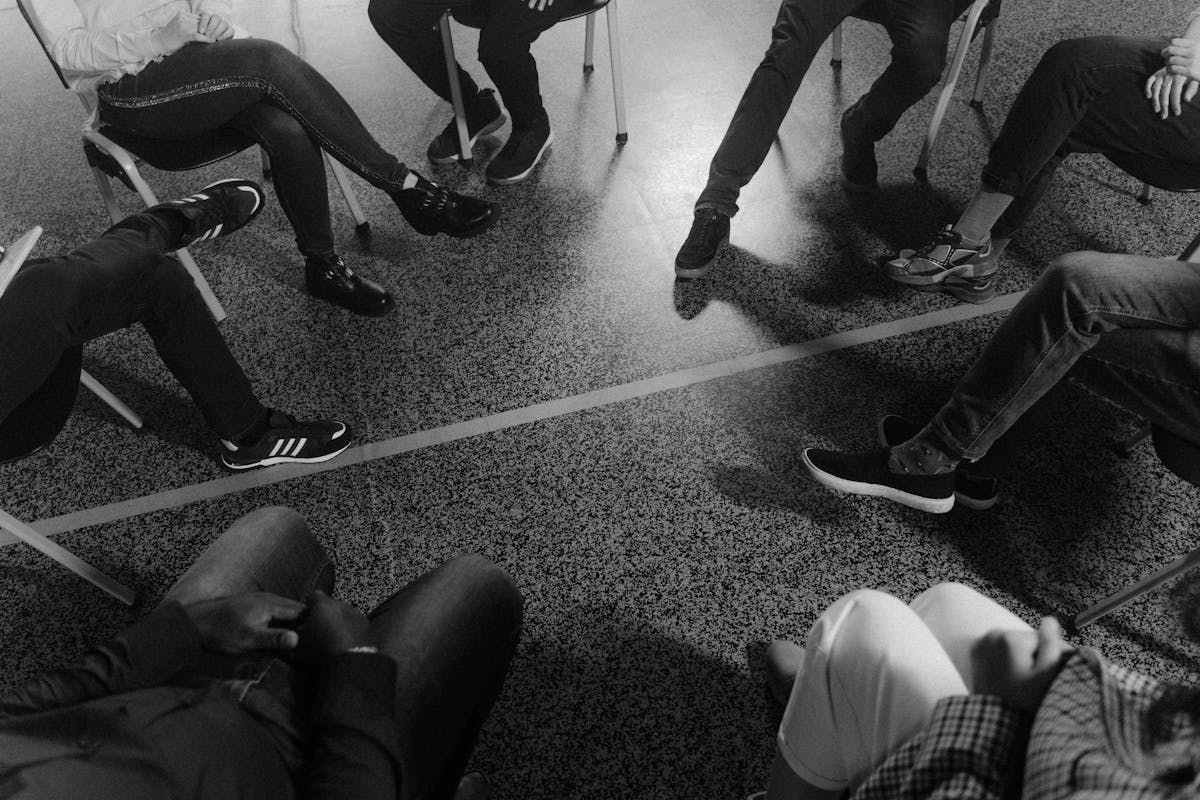College Students and Substance Abuse: A Parent's Complete Guide
Everything you need to know about protecting your college student, recognizing warning signs, and finding the right help when it matters most
📋 Your Complete Parent Guide
- The Reality Check: How Common Is This Really?
- Warning Signs Every Parent Must Know
- Why College Students Are So Vulnerable
- How to Talk to Your College Student About This
- What Substances Should You Be Worried About?
- The Mental Health Connection You Need to Understand
- When to Step In: A Parent's Action Guide
- Treatment Options That Actually Work
- How to Support Your Child Through Recovery
- Hope and Success Stories: Recovery Is Possible
As a parent, few things are more frightening than suspecting your college student might be struggling with substance abuse. The late-night phone calls that don't come, the deflecting answers when you ask how they're doing, the declining grades, or that nagging feeling that something just isn't right—these concerns keep parents awake at night.
If you're reading this, you're not alone. Thousands of parents face this exact situation every year, and many feel lost about what to do next. The good news is that substance abuse among college students, while serious, is highly treatable when addressed properly. More importantly, recognizing the problem early dramatically improves outcomes.
For Parents Reading This Right Now
Take a deep breath. Whether you're dealing with confirmed substance abuse or just have concerns, you're taking the right step by educating yourself. Knowledge is your most powerful tool, and there are clear, actionable steps you can take to help protect your child and support their recovery if needed.
This guide provides everything you need to know about college students and substance abuse—from understanding how common the problem really is, to recognizing warning signs, to finding the right evidence-based addiction treatment if your child needs help. You'll also learn about the latest research on what works and what doesn't, so you can make informed decisions during what may be one of the most stressful times in your life as a parent.

Early intervention and open communication are key to helping college students overcome substance abuse
Most importantly, this guide is written with hope. Recovery from substance abuse is not only possible but increasingly common among college students who receive appropriate support. With the right approach, many students not only overcome substance abuse but emerge stronger and more resilient, going on to complete their education and build successful, fulfilling lives.
The Reality Check: How Common Is This Really?
Before diving into what you should watch for, it's important to understand the scope of substance abuse among college students. The numbers might surprise you—and they'll help you realize that if your child is struggling, they're far from alone.
According to the National Institute on Alcohol Abuse and Alcoholism (NIAAA), approximately 49.6% of college students ages 18-25 reported drinking alcohol in the past month. More concerning, 29.3% engaged in binge drinking, and 15.1% of young adults in this age group met the criteria for alcohol use disorder.
What This Means for Your Family
These statistics aren't meant to alarm you, but rather to provide context. College students and substance abuse problems are unfortunately common, which means:
- Your child isn't alone if they're struggling with substance abuse
- Treatment providers understand college-specific substance abuse issues
- Universities have resources because this is a recognized problem
- Recovery is common among college students who receive appropriate help
The Most Concerning Statistic
Research from TimelyCare reveals that 37% of college students regularly abuse drugs and/or alcohol, yet the vast majority never receive treatment. This massive treatment gap means that millions of students—and their families—are suffering in silence, believing they should be able to handle the problem on their own.
The treatment gap exists largely because college students often don't recognize they have a problem, fear academic consequences, or don't know where to turn for help. This is exactly why parent awareness and intervention can be life-changing.
The reality is that substance abuse among college students has been steadily increasing over the past two decades. Factors like increased academic pressure, social media stress, easier access to substances, and the normalization of heavy drinking in college culture have all contributed to this rise.
However, awareness of the problem has also increased dramatically. Universities, treatment providers, and families are better equipped than ever to address college students and substance abuse issues. Specialized treatment approaches designed specifically for college-age students are now widely available, and success rates are encouraging for those who receive appropriate help.

Academic pressure and stress contribute significantly to substance abuse among college students
As a parent, understanding these statistics can help you approach potential conversations with your child from a place of knowledge rather than panic, and with hope rather than despair. The problem is common, well-understood, and highly treatable when addressed properly.
Warning Signs Every Parent Must Know
Recognizing the warning signs of substance abuse in college students can be challenging because many symptoms can mimic normal college stress or adjustment issues. However, understanding what to look for—and more importantly, recognizing patterns of concerning behaviors—can help you identify problems early when treatment is most effective.
Academic Changes: Often the First Red Flag
For many parents, academic changes are the first noticeable sign that something is wrong. Watch for:
- Declining grades after previously strong academic performance
- Frequent absences, especially on Mondays and Fridays
- Missed assignment deadlines or incomplete coursework
- Changes in major or course load without clear explanation
- Academic probation or disciplinary actions from the university
What Parents Should Do
If you notice academic changes, don't immediately assume substance abuse. Start with a caring conversation about stress and support. Ask open-ended questions like "How are you managing everything this semester?" rather than accusatory questions about grades.
Communication and Relationship Changes
Changes in how your child communicates with you can be particularly telling:
- Avoiding phone calls or keeping conversations very brief
- Evasive answers about activities, friends, or how they spend their time
- Mood swings during conversations—unusually irritable, depressed, or euphoric
- Asking for money frequently, especially with vague explanations
- Canceling visits home or seeming reluctant to spend time with family
Physical and Behavioral Warning Signs
When you do see your college student, pay attention to physical changes:
- Changes in appearance—significant weight loss/gain, poor hygiene, tired appearance
- Sleep pattern changes—sleeping through important events or staying awake for unusually long periods
- Bloodshot eyes, dilated pupils, or frequent use of eye drops
- Unusual smells on clothing or in their living space
- Finding paraphernalia—bottles, pills, smoking devices, or unusual items
Social and Financial Red Flags
Changes in social patterns and financial behavior can also indicate problems:
- New friend groups with whom they're secretive about
- Loss of old friendships or activities they previously enjoyed
- Unexplained expenses or inability to account for money
- Legal troubles—arrests, citations, or campus disciplinary actions
- Risky behaviors—driving under the influence, unsafe sexual practices
🚨 Critical Pattern Recognition
The key isn't any single warning sign, but rather multiple signs occurring together or a clear pattern of declining function across different areas of life. Trust your parental instincts—if something feels wrong, it probably is.
The Challenge of Long-Distance Parenting
One of the biggest challenges for parents is that many warning signs are easier to miss when your child is away at college. This is why maintaining regular, meaningful communication is so important. Video calls can reveal more than phone calls, and unexpected visits (when possible) can provide valuable insights into your child's living situation and wellbeing.

Multiple warning signs appearing together often indicate a serious problem requiring parental attention
What Not to Do When You See Warning Signs
Equally important is knowing what not to do when you notice concerning changes:
- Don't immediately jump to accusations about substance abuse
- Don't enable the behavior by providing money without accountability
- Don't ignore the signs hoping they'll go away on their own
- Don't try to handle everything yourself—professional help is often needed
Remember, recognizing warning signs is just the first step. The next sections will help you understand why college students are so vulnerable to substance abuse and how to approach conversations about your concerns in ways that are most likely to be helpful rather than create more distance.
Why College Students Are So Vulnerable
Understanding why college students are at such high risk for substance abuse can help you as a parent approach the situation with more empathy and less judgment. The college years create a unique combination of developmental, environmental, and social factors that, when combined, create what addiction specialists call a "perfect storm" for substance abuse problems.
Brain Development: The Science Behind the Risk
One of the most important things for parents to understand is that your college student's brain is still developing. The prefrontal cortex—responsible for decision-making, impulse control, and risk assessment—doesn't fully mature until around age 25. This means college students are biologically more likely to:
- Make impulsive decisions without fully considering consequences
- Be influenced by peer pressure and social situations
- Underestimate the risks of substance use
- Have difficulty controlling their substance use once they start
What This Means for Parents
Your child's risky behavior isn't necessarily a reflection of your parenting or their character. Brain science shows us that college-age students are neurologically more vulnerable to poor decision-making, especially around substances. Approaching the situation with this understanding can help reduce blame and focus on solutions.
The Stress Factor: Academic and Social Pressures
Today's college students face unprecedented levels of stress that can drive them toward substance use as a coping mechanism:
- Academic pressure—competition for grades, internships, and graduate school admission
- Financial stress—student loans, living expenses, and pressure to work while studying
- Social anxiety—pressure to fit in and make friends in new environments
- Future uncertainty—concerns about career prospects and life after college
- Family expectations—pressure to succeed and justify educational investments
Research from TimelyCare shows that 71% of college students experience mental health challenges, with stress being the primary contributing factor. When students lack healthy coping mechanisms, substances can seem like an attractive solution for managing overwhelming feelings.
Environmental Risk Factors
The college environment itself creates unique risks that don't exist in other settings:
Reduced Supervision
Sudden freedom from parental oversight combined with minimal adult supervision can lead to poor decision-making
Easy Access to Substances
College campuses often have readily available alcohol and drugs, with social networks that facilitate access
Cultural Normalization
Heavy drinking and drug use are often viewed as normal parts of the "college experience"
Social Integration
Substance use becomes intertwined with social activities, making it harder to avoid without feeling isolated
Mental Health Challenges
Mental health issues often emerge or worsen during college years, creating additional vulnerability to substance abuse:
- Depression and anxiety frequently develop during late adolescence
- Eating disorders can emerge due to body image pressures and stress
- Sleep disorders are common due to irregular schedules and academic pressure
- Trauma responses may surface as students process past experiences
Many students turn to substances to self-medicate these mental health challenges, not realizing they're often making the underlying problems worse and creating additional complications that require specialized dual diagnosis treatment.

Social environments and party culture normalize substance use, making it harder for students to recognize problems
The Social Media Factor
Social media adds another layer of pressure and risk for college students:
- Constant comparison to peers who seem to be succeeding effortlessly
- FOMO (fear of missing out) driving participation in risky social activities
- Pressure to maintain a perfect image while struggling privately
- Cyberbullying or online harassment adding to stress and anxiety
Financial Independence Challenges
The transition to financial independence creates additional stressors:
- Managing money for the first time without parental oversight
- Balancing work and school responsibilities
- Accumulating student debt and worrying about future financial security
- Peer pressure to spend money on social activities or substances
Understanding these risk factors helps explain why good kids from good families can still develop substance abuse problems in college. It's not about moral failure or weak character—it's about a challenging environment colliding with developmental vulnerability.
As a parent, recognizing these factors can help you approach conversations with your college student from a place of understanding rather than judgment. It can also help you identify specific stressors your child might be facing and work together to develop healthier coping strategies before substance abuse becomes a problem.
How to Talk to Your College Student About This
Having a conversation with your college student about substance abuse is one of the most challenging discussions you'll face as a parent. Whether you're addressing confirmed substance use or just expressing concerns, how you approach the conversation can determine whether it becomes a turning point toward help or drives your child further away.
Before the Conversation: Preparing Yourself
Your emotional state and preparation will significantly impact the conversation's effectiveness:
- Choose the right time—not during a crisis, when emotions are high, or when either of you is rushed
- Educate yourself—know the facts about college students and substance abuse, treatment options, and campus resources
- Manage your emotions—if you're feeling angry, panicked, or judgmental, wait until you can approach the topic from a place of love and concern
- Set realistic expectations—this likely won't be resolved in one conversation
Script Ideas for Starting the Conversation
- "I've noticed some changes lately, and I'm concerned about you. Can we talk?"
- "I love you and want to support you. I've been worried about some things I've observed."
- "I'm here for you no matter what. I'd like to understand what's going on in your life."
What TO Say: Effective Communication Strategies
Use "I" Statements
Focus on your observations and concerns rather than accusations:
- "I've noticed your grades have dropped" instead of "You're failing your classes"
- "I'm concerned about some changes I've seen" instead of "You're obviously using drugs"
- "I want to help you" instead of "You need to stop this behavior"
Express Unconditional Love and Support
Make it clear that your love isn't conditional on their behavior:
- "No matter what's happening, I love you and we'll figure this out together"
- "I'm proud of you for so many things, and I want to help you through this challenge"
- "My job as your parent is to support you, especially during difficult times"
Focus on Specific Behaviors and Observations
Be concrete about what you've noticed rather than making general statements:
- "You've missed our last three scheduled calls"
- "Your professor contacted me about excessive absences"
- "I noticed you seemed very tired during our visit"
What NOT to Say: Common Mistakes That Backfire
Phrases That Will Shut Down Communication
- "How could you do this to our family?"
- "You're just like [family member with addiction]"
- "You're throwing your life away"
- "We didn't raise you to be like this"
- "You're disappointing everyone who believes in you"
Handling Different Responses
If They Deny There's a Problem
- Don't argue or try to convince them immediately
- Acknowledge their perspective: "I hear you saying that you don't think this is a problem"
- Share your specific concerns without demanding they agree
- Ask them to help you understand their perspective
If They Get Angry or Defensive
- Stay calm and don't take the bait to argue
- Acknowledge their feelings: "I can see you're upset about this conversation"
- Reiterate your love and concern
- Suggest taking a break and continuing the conversation later
If They Admit to Having a Problem
- Thank them for their honesty
- Ask how you can best support them
- Discuss next steps together rather than dictating solutions
- Offer to help research treatment options or campus resources
Setting Boundaries and Consequences
While approaching with love and support, you may need to establish clear boundaries:
- Financial boundaries—what you will and won't continue to pay for
- Communication expectations—regular check-ins or family meetings
- Academic requirements—maintaining certain grades or enrollment status
- Treatment compliance—getting professional help as a condition of continued support
💡 Remember This
The goal of the initial conversation isn't to solve everything immediately. It's to open communication, express your concerns and love, and begin working together toward solutions. Many parents need multiple conversations before their college student is ready to accept help.
Following Up After the Conversation
The conversation doesn't end when you hang up the phone or they leave the room:
- Send a follow-up message reiterating your love and support
- Research resources and treatment options to share
- Give them space to process the conversation
- Schedule a follow-up conversation to continue the discussion
- Consider involving other trusted family members or professionals

Open, non-judgmental communication creates the foundation for getting help and supporting recovery
Remember, having this conversation takes courage, and approaching it with preparation, love, and realistic expectations gives you the best chance of maintaining your relationship with your child while addressing your concerns about substance abuse. Even if the first conversation doesn't go as planned, you've opened the door for future discussions and shown your child that you're paying attention and care about their wellbeing.
What Substances Should You Be Worried About?
As a parent, understanding which substances are most commonly abused by college students can help you have informed conversations and know what warning signs to look for. The landscape of substance abuse among college students has evolved significantly, with some traditional concerns remaining while new risks have emerged.
Alcohol: The Most Common and Dangerous
Despite being legal for students over 21, alcohol remains the most significant substance abuse concern on college campuses:
- Nearly 50% of college students consumed alcohol within the past month
- 29% engage in binge drinking—a pattern that's particularly dangerous
- 15% meet criteria for alcohol use disorder—meaning their drinking has become a clinical problem
- Over 1,500 college students die annually from alcohol-related injuries
According to NIAAA research on harmful college drinking, the consequences extend far beyond individual health, affecting entire campus communities and families.
What Parents Need to Know About College Drinking
Many parents assume college drinking is "just a phase," but binge drinking patterns established in college often continue into adulthood. The concern isn't occasional social drinking—it's the pattern of drinking to get drunk, drinking alone, or drinking to cope with stress that signals a problem.
Prescription Stimulants: The "Study Drug" Crisis
Prescription stimulants like Adderall, Ritalin, and Vyvanse are increasingly abused by college students who don't have ADHD diagnoses:
- Used to enhance academic performance—staying awake for all-nighters, improving focus during exams
- Often viewed as "safe" because they're FDA-approved medications
- High potential for abuse and dependence, especially under academic pressure
- Dangerous side effects including anxiety, heart problems, and sleep disruption
Marijuana: Increasingly Normalized but Still Risky
With legalization in many states, marijuana use among college students has increased significantly:
- 39.5% of college students report annual marijuana use
- Often perceived as harmless, leading to regular daily use
- Can impair cognitive function and motivation, affecting academic performance
- Higher potency products (like concentrates) carry increased risks
Prescription Anti-Anxiety Medications
Benzodiazepines like Xanax, Ativan, and Klonopin are frequently abused by college students:
- Used to manage anxiety or "come down" from stimulants
- Extremely dangerous when combined with alcohol—can be fatal
- High potential for physical dependence, even with short-term use
- Withdrawal can be dangerous and requires medical supervision
One of the most dangerous trends is "polydrug use"—combining multiple substances like mixing alcohol with prescription medications, stimulants with depressants, or various combinations that dramatically increase overdose risk.
Other Substances of Concern
Cocaine and Other Stimulants
- Often used in party settings or to enhance academic performance
- High addiction potential and serious cardiovascular risks
- May be mixed with dangerous substances like fentanyl
Hallucinogens (LSD, MDMA, Mushrooms)
- Used in party or festival settings
- Can trigger mental health problems in vulnerable individuals
- Often contaminated with other dangerous substances
Vaping and Nicotine Products
- E-cigarettes often seen as "harmless" compared to cigarettes
- Contain highly addictive nicotine
- May serve as gateway to other substance use
Specific Risks for College Students
What makes these substances particularly dangerous for college students:
- Academic pressure drives use of performance-enhancing substances
- Social integration means substance use becomes tied to friendships and activities
- Stress management leads to self-medication attempts
- Poor decision-making due to brain development and peer influence
- Easy access through campus networks and online sources

Prescription medication abuse has become increasingly common among college students seeking academic enhancement
Warning Signs by Substance Type
Alcohol Abuse Signs
- Frequent hangovers or being drunk during video calls
- Drinking alone or at inappropriate times
- Memory problems or blackouts
- Aggressive behavior or personality changes when drinking
Stimulant Abuse Signs
- Staying awake for extended periods followed by crashes
- Rapid weight loss and decreased appetite
- Excessive energy followed by extreme fatigue
- Anxiety, paranoia, or panic attacks
Depressant/Anti-Anxiety Medication Abuse Signs
- Slurred speech or appearing drowsy during conversations
- Memory problems or confusion
- Poor coordination or appearing "out of it"
- Dangerous combination with alcohol
When to Seek Immediate Help
If you suspect your college student is using any substances and shows signs of overdose, alcohol poisoning, or is expressing suicidal thoughts, call 911 immediately. Don't wait to see if things improve—immediate medical attention can save lives.
Understanding these substances and their specific risks can help you have more informed conversations with your college student about substance abuse. It also helps you recognize that substance abuse problems require specialized treatment approaches that address the specific substances involved and their effects on your child's health and wellbeing.
The Mental Health Connection You Need to Understand
One of the most critical things for parents to understand about college students and substance abuse is how closely it's connected to mental health challenges. This connection isn't just coincidental—it's so common that treatment professionals have a term for it: "dual diagnosis" or "co-occurring disorders." Understanding this relationship can help you approach your child's situation with more compassion and ensure they get comprehensive treatment.
How Common Is the Mental Health Connection?
The statistics reveal just how intertwined mental health and substance abuse are among college students:
- 37% of alcohol abusers and 53% of drug abusers also have at least one serious mental illness
- 1 in 3 college students meet clinical criteria for anxiety or depression
- 71% of college students report experiencing mental health challenges according to TimelyCare research
- Many students use substances to self-medicate untreated anxiety, depression, or trauma
According to SAMHSA research on co-occurring disorders, more than one in four adults living with serious mental health problems also has a substance use problem, with this rate being even higher among college-age individuals.
What This Means for Your Child's Treatment
If your college student is struggling with both substance abuse and mental health issues, both conditions must be treated simultaneously. Traditional addiction treatment that ignores mental health, or mental health treatment that ignores substance abuse, typically fails because these conditions feed into each other.
The Self-Medication Cycle
Many college students begin using substances as a way to manage mental health symptoms they don't understand or don't know how to address:
Mental Health Symptoms Emerge
College stress triggers or worsens anxiety, depression, trauma responses, or other mental health conditions
Self-Medication Begins
Student discovers that alcohol, marijuana, or other substances temporarily relieve uncomfortable symptoms
Tolerance and Dependence
Over time, more substances are needed to achieve the same relief, and withdrawal worsens original symptoms
Worsening Mental Health
Substance use actually makes mental health symptoms worse, creating a vicious cycle requiring dual treatment
Common Mental Health Conditions in College Students
Anxiety Disorders
Anxiety is extremely common among college students and often leads to substance abuse:
- Social anxiety—students may drink to feel more comfortable in social situations
- Performance anxiety—academic pressure can trigger anxiety that students try to manage with substances
- Generalized anxiety—chronic worry about multiple aspects of college life
Depression
Depression often emerges during college years and has a strong connection to substance abuse:
- Students may use alcohol or drugs to temporarily escape feelings of sadness or hopelessness
- Substances initially seem to improve mood but actually worsen depression over time
- Depression can make it harder to recognize substance abuse problems
Trauma and PTSD
Many college students have experienced trauma, which significantly increases substance abuse risk:
- Childhood trauma, sexual assault, accidents, or other traumatic experiences
- Substances used to numb traumatic memories or manage PTSD symptoms
- Trauma often remains unaddressed while substance abuse gets worse
Academic Stress and Mental Health
Research from Newport Institute shows that nine out of 10 students believe there is a mental health crisis on college campuses, with academic stress being a primary contributor:
- Perfectionism—unrealistic expectations leading to anxiety and substance use
- Imposter syndrome—feeling like they don't belong or aren't capable enough
- Future uncertainty—anxiety about career prospects and life after college
- Financial pressure—stress about student loans and educational costs
Signs Your Child May Have Co-Occurring Disorders
Watch for these patterns that suggest both mental health and substance abuse issues:
- Using substances specifically to manage emotions—drinking when sad, using stimulants for anxiety
- Mood swings that seem extreme even considering normal college stress
- Social isolation combined with substance use
- Academic performance decline along with mental health symptoms
- Sleep problems that existed before substance use began
- Family history of both mental illness and substance abuse

Professional mental health support addresses the root causes that often drive college students toward substance abuse
Why This Connection Gives Reason for Hope
While the connection between mental health and substance abuse might seem overwhelming, it actually provides reasons for optimism:
- Treatment is very effective when both conditions are addressed together
- Mental health treatment often dramatically reduces substance abuse
- Students gain life skills for managing stress and emotions healthily
- Recovery addresses root causes rather than just stopping substance use
Getting Comprehensive Help
If you suspect your college student has both substance abuse and mental health issues:
- Look for treatment programs that specialize in dual diagnosis
- Ensure any treatment provider addresses both conditions simultaneously
- Understand that treatment may take longer than addressing substance abuse alone
- Be patient—recovery from co-occurring disorders is a process, but it's very achievable
Understanding the mental health connection helps explain why simply telling your child to "stop drinking" or "quit using drugs" rarely works. The substances are often serving a function—managing uncomfortable emotions or mental health symptoms. Effective treatment addresses both the substance abuse and the underlying mental health challenges, giving your child the tools they need for lasting recovery and overall wellbeing.
When to Step In: A Parent's Action Guide
One of the most challenging decisions parents face is knowing when and how to intervene in their college student's life, especially around substance abuse concerns. The balance between respecting their growing independence and protecting them from serious harm can feel impossible to navigate. This guide provides clear criteria for when parental intervention is necessary and how to take action effectively.
Clear Signals That Immediate Action Is Needed
Crisis Situations Requiring Immediate Intervention
- Threats of suicide or self-harm—call 911 or crisis hotlines immediately
- Alcohol poisoning or overdose symptoms—seek emergency medical care
- Arrests or legal troubles related to substance use
- Academic suspension or expulsion due to substance-related incidents
- Dangerous behavior—drunk driving, unsafe sexual practices, violence
Warning Signs That Indicate It's Time to Step In
Academic Deterioration
- Failing multiple classes or GPA dropping significantly
- Academic probation or warnings from the university
- Excessive absences that professors or advisors mention
- Dropping classes without reasonable explanation
- Considering leaving school due to poor performance
Financial Red Flags
- Frequent requests for money with vague explanations
- Inability to account for expenses or where money is going
- Maxed out credit cards or financial emergencies
- Missing rent or tuition payments despite having adequate funds
- Selling personal belongings for unexplained reasons
Relationship and Communication Changes
- Consistently avoiding family contact for weeks at a time
- Lying about activities, friends, or whereabouts
- Dramatic personality changes that persist over time
- Old friendships ending while new, secretive relationships form
- Family events missed or canceled repeatedly
Trust Your Parental Instincts
If multiple warning signs are present, or if you have a persistent gut feeling that something is seriously wrong, don't second-guess yourself. Parents often know their children better than anyone else, and those instincts are usually accurate. It's better to err on the side of caution than to wait until problems become more severe.
Your Step-by-Step Action Plan
Step 1: Gather Information
- Document specific incidents and changes you've observed
- Contact the university to understand their perspective on your child's performance
- Research resources—both campus-based and professional treatment options
- Consult with professionals like addiction counselors or family therapists
Step 2: Plan Your Approach
- Choose the right time and place for a serious conversation
- Prepare what you want to say using the communication strategies discussed earlier
- Have resources ready—treatment options, campus services, contact information
- Consider involving others—other family members, family friends, or professionals
Step 3: Have the Conversation
- Express specific concerns based on observable behaviors
- Offer unconditional love and support while setting clear boundaries
- Present options rather than ultimatums when possible
- Listen to their perspective and acknowledge their feelings
Step 4: Follow Through
- Help them access resources if they agree to seek help
- Implement boundaries you've set if they refuse help
- Maintain consistent follow-up rather than hoping things improve on their own
- Get support for yourself—family therapy, support groups, or counseling
Setting Effective Boundaries
When intervention is necessary, clear boundaries help protect both you and your child:
Financial Boundaries
- Stop providing cash that could be used for substances
- Pay directly for necessities—tuition, rent, groceries—rather than giving money
- Require receipts or accountability for any financial support
- Set consequences for financial irresponsibility
Academic Boundaries
- Require maintaining enrollment as a condition of support
- Set minimum GPA expectations for continued financial assistance
- Insist on communication with academic advisors or professors
- Connect continued support to academic progress
Treatment Boundaries
- Make professional help non-negotiable for continued support
- Require participation in treatment programs or counseling
- Insist on regular drug/alcohol testing if substance abuse is confirmed
- Set consequences for refusing treatment or not following through

Taking decisive action while maintaining support can help college students accept the help they need
When Professional Intervention Is Necessary
Sometimes parental intervention isn't enough, and professional help is needed:
- Professional interventionists can help plan and conduct formal interventions
- Campus counseling services may be able to reach students who won't talk to parents
- Treatment centers often have specialists who can guide intervention strategies
- Family therapists can facilitate difficult conversations and help with boundary-setting
Taking Care of Yourself During This Process
Remember that you can't control your child's choices, but you can control your response:
- Set boundaries to protect your own wellbeing
- Join support groups for families affected by addiction
- Consider individual therapy to help you navigate this challenging time
- Remember that you didn't cause this and you can't cure it alone
🎯 The Bottom Line
Intervention is necessary when your college student's substance abuse is creating serious consequences that they can't or won't address themselves. Acting early, with love but firm boundaries, gives your child the best chance at recovery and preserves your relationship for the future.
Taking action when you recognize serious substance abuse problems isn't giving up on your child's independence—it's protecting them when they can't protect themselves. Most college students who receive appropriate intervention and treatment are grateful for their parents' courage in stepping in when it mattered most.
Treatment Options That Actually Work
When your college student needs professional help for substance abuse, understanding the available treatment options can help you make informed decisions and advocate for the most effective care. The good news is that treatment approaches specifically designed for college students have shown excellent success rates, and many students are able to continue their education while receiving help.
Campus-Based Treatment Options
University Counseling Centers
Most colleges offer substance abuse counseling through their health and counseling services:
- Individual counseling with addiction specialists
- Group therapy specifically for students with substance abuse issues
- Assessment and referral services to determine the appropriate level of care
- Crisis intervention for emergencies
- Coordination with academic support services
Collegiate Recovery Programs (CRPs)
Research from the Hazelden Betty Ford Foundation shows that Collegiate Recovery Programs are among the most effective interventions for college students with substance abuse issues:
- Substance-free housing options on or near campus
- Recovery-focused social activities that don't involve substances
- Peer support groups led by students in recovery
- Academic support services to help students succeed in school
- Professional counseling integrated with campus life
📊 CRP Success Rates
One study found that 87.5% of Collegiate Recovery Program alumni had no relapse following graduation, demonstrating the effectiveness of treating addiction within the college environment rather than removing students from school for treatment.
Outpatient Treatment Options
Intensive Outpatient Programs (IOPs)
IOPs allow college students to receive substantial treatment while continuing their education:
- 9-12 hours of treatment per week typically in evening or weekend sessions
- Individual therapy to address personal issues and triggers
- Group counseling with other college students facing similar challenges
- Family therapy to improve communication and support
- Educational sessions about addiction, recovery, and life skills
Partial Hospitalization Programs (PHPs)
For students who need more intensive treatment but can still live at home or in campus housing:
- 5-6 hours of treatment per day, typically 5 days per week
- More intensive than IOP but allows students to maintain some academic responsibilities
- May include medical monitoring for withdrawal or mental health issues
- Often serves as step-down from residential treatment
Questions to Ask Outpatient Programs
- Do you have experience treating college students specifically?
- How do you coordinate with academic schedules and requirements?
- What is your approach to treating co-occurring mental health issues?
- Do you provide family therapy and support services?
- What are your success rates with college-age patients?
Residential Treatment Options
When Residential Treatment Is Necessary
Some situations require removing the student from the college environment temporarily:
- Severe addiction that makes functioning in college impossible
- Multiple failed outpatient attempts
- Serious mental health issues requiring intensive treatment
- Medical complications from substance abuse
- Dangerous behaviors that put the student or others at risk
College-Specific Residential Programs
Many treatment centers now offer specialized residential programs for college students:
- Age-appropriate treatment groups with other college students
- Academic support and planning for returning to school
- Career and life skills counseling
- Family therapy and education programs
- Transition planning for returning to campus life
Specialized Treatment Approaches
Dual Diagnosis Treatment
Since mental health issues are so common among college students with substance abuse, look for programs that specialize in treating both conditions simultaneously:
- Integrated treatment teams that include addiction and mental health specialists
- Psychiatric services for medication management when appropriate
- Trauma-informed care for students with trauma histories
- Evidence-based therapies like CBT, DBT, or EMDR
Medication-Assisted Treatment (MAT)
For students with severe alcohol or opioid addiction, medications can be an important part of treatment:
- Naltrexone for alcohol use disorder—reduces cravings and blocks euphoric effects
- Buprenorphine for opioid addiction—reduces cravings and withdrawal symptoms
- Always combined with counseling and behavioral therapies
- Carefully monitored by addiction medicine specialists

Group therapy with other college students provides peer support and shared understanding of academic pressures
Academic Considerations During Treatment
Medical Leave of Absence
If residential treatment is necessary, most universities offer medical leave options:
- Protects academic standing while receiving treatment
- May allow partial tuition refunds depending on timing
- Provides structure for returning to school after treatment
- Often requires documentation from treatment providers
Accommodations for Ongoing Treatment
Universities are required to provide reasonable accommodations for students in recovery:
- Flexible scheduling for treatment appointments
- Academic support services to help catch up on missed work
- Housing accommodations like substance-free dormitories
- Reduced course loads when appropriate
Insurance and Financial Considerations
Understanding insurance coverage for addiction treatment can help you access appropriate care:
- Most insurance plans are required to cover substance abuse treatment at the same level as medical care
- Student health insurance often includes mental health and addiction services
- Many treatment centers offer payment plans or sliding fee scales
- Some scholarships are available specifically for addiction treatment
Don't let cost concerns prevent you from getting help for your college student. Many treatment options are covered by insurance, and most providers will work with families to make treatment financially feasible. The cost of not treating substance abuse—in terms of health, academic failure, and future opportunities—is much higher than the cost of treatment.
Choosing the Right Treatment Program
When evaluating treatment options for your college student:
- Look for college-specific programs that understand academic pressures and developmental needs
- Ensure they treat co-occurring mental health issues
- Ask about success rates and follow-up support
- Verify staff credentials and program accreditation
- Consider location—near campus vs. away from triggers
- Evaluate family involvement opportunities and requirements
The most effective treatment programs for college students recognize that addiction doesn't exist in a vacuum. They address the whole person—the substance abuse, underlying mental health issues, academic concerns, family relationships, and future goals. With the right treatment approach, most college students can achieve lasting recovery and go on to complete their education successfully. Learn more about comprehensive addiction treatment programs that understand the unique needs of college students.
How to Support Your Child Through Recovery
Supporting a college student through addiction recovery is one of the most challenging yet important things you'll do as a parent. Your support can make the difference between successful long-term recovery and repeated relapses. However, knowing how to be supportive without enabling, how to maintain boundaries while showing love, and how to take care of yourself during this process requires careful balance and ongoing education.
Understanding Your Role in Recovery
As a parent, your role in your child's recovery is crucial but specific. You are not their therapist, their accountability partner, or responsible for their sobriety. Instead, you provide:
- Unconditional love and emotional support
- Appropriate boundaries that promote recovery
- Access to professional resources and treatment
- A stable, supportive family environment
- Hope and encouragement during difficult times
The Most Important Thing to Remember
You didn't cause your child's addiction, you can't control their choices, and you can't cure their addiction. What you can do is create an environment that supports their recovery efforts while maintaining your own physical and emotional wellbeing.
Supporting Different Stages of Recovery
During Active Treatment
Whether your child is in residential treatment, outpatient programs, or campus-based recovery:
- Participate in family therapy sessions when offered or required
- Educate yourself about addiction and recovery
- Follow treatment team recommendations even when they're difficult
- Maintain appropriate contact as recommended by treatment providers
- Avoid trying to "fix" or manage their recovery from a distance
Early Recovery (First 90 Days)
This is often the most challenging time for both students and families:
- Expect emotional ups and downs—recovery isn't linear
- Support their treatment compliance without nagging or monitoring excessively
- Help them rebuild structure and routine in their daily life
- Celebrate small victories rather than focusing on perfection
- Be patient with academic recovery—grades may take time to improve
Ongoing Recovery
As recovery progresses and stabilizes:
- Continue supporting their recovery activities like therapy, support groups, and sober activities
- Gradually increase trust and independence based on consistent behavior
- Help them plan for challenges like social situations, stress, and academic pressure
- Support their academic goals while maintaining recovery as the priority
- Encourage healthy relationships and activities
Communication Strategies That Support Recovery
What TO Say
- "I'm proud of the work you're doing in recovery"
- "How can I best support you right now?"
- "I love you regardless of what happens"
- "Recovery is hard work, and you're doing it"
- "What did you learn in therapy this week?" (if they're willing to share)
What NOT to Say
- "Are you staying sober?" (puts them on the defensive)
- "You look so much better now" (implies they looked terrible before)
- "Just don't drink/use drugs and you'll be fine" (oversimplifies addiction)
- "I'm glad this is all behind us now" (recovery is ongoing, not a past event)
- "You owe us for all the worry you caused" (creates guilt and shame)
Focus on their efforts and progress rather than outcomes you want to see. Recovery is about much more than just not using substances—it's about building a healthier, more fulfilling life.
Setting Healthy Boundaries
Financial Boundaries
- Continue paying for recovery-supportive expenses—therapy, treatment programs, healthy activities
- Avoid providing cash that could be used for substances
- Pay directly for necessities like tuition, rent, and groceries
- Require accountability for any financial support provided
- Set clear consequences for financial irresponsibility
Academic Boundaries
- Support academic success while recognizing recovery comes first
- Encourage realistic course loads that don't jeopardize recovery
- Support accommodations for treatment appointments and recovery activities
- Celebrate academic progress without making grades the primary focus
Communication Boundaries
- Set regular check-in times that work for both of you
- Respect their privacy about treatment details while maintaining general communication
- Avoid becoming their recovery monitor—that's the treatment team's job
- Don't enable manipulation or drama by giving in to crisis demands

Supportive family relationships provide crucial foundation for successful long-term recovery
Handling Setbacks and Relapses
Setbacks are common in recovery, and how you respond can significantly impact your child's willingness to continue treatment:
If a Relapse Occurs
- Stay calm and avoid panic responses
- Express concern and love, not anger or disappointment
- Encourage immediate return to treatment rather than giving up
- Work with their treatment team to adjust the recovery plan
- Maintain boundaries while offering continued support
Learning from Setbacks
- Help them identify triggers that led to the relapse
- Support changes to their recovery plan
- Encourage honesty about challenges they're facing
- Reinforce that relapse doesn't mean failure—it's often part of the process
Taking Care of Yourself
Supporting someone through recovery is emotionally and physically exhausting. Taking care of yourself isn't selfish—it's necessary:
- Join a support group for families affected by addiction
- Consider individual therapy to process your own emotions and experiences
- Maintain your own interests and relationships outside of your child's recovery
- Set limits on how much emotional energy you give to worry and crisis management
- Practice self-compassion—you're doing the best you can in a difficult situation
Building a Recovery-Supportive Family Environment
Creating a family environment that supports recovery:
- Educate all family members about addiction and recovery
- Modify family gatherings to be recovery-friendly when possible
- Address family dynamics that may have contributed to or enabled addiction
- Celebrate recovery milestones in meaningful ways
- Support their sober social activities and new friendships
🤝 The Long View
Recovery is a lifelong process, not a destination. Your ongoing support, balanced with appropriate boundaries and self-care, provides the foundation your child needs to build a successful, sober life. Most college students who achieve lasting recovery credit their family's love and support as crucial factors in their success.
Remember that supporting recovery is a marathon, not a sprint. There will be good days and challenging days, progress and setbacks, hope and frustration. By maintaining consistent love and support while respecting boundaries and taking care of yourself, you provide your child with the best possible foundation for long-term recovery success. Many families find that going through recovery together ultimately strengthens their relationships and creates deeper understanding and connection than existed before. Professional guidance through family therapy and education can help you navigate this challenging but ultimately rewarding journey.
Hope and Success Stories: Recovery Is Possible
As we reach the end of this guide, it's crucial to end where every parent's heart needs to be: with hope. While the statistics about college students and substance abuse can feel overwhelming, the recovery success stories are equally compelling and far more uplifting. Every year, thousands of college students overcome substance abuse, complete their education, and go on to build successful, meaningful lives.
The Reality of Recovery Success
The numbers tell a story of hope that often gets overshadowed by crisis statistics:
- 87.5% of students in Collegiate Recovery Programs maintain sobriety after graduation
- Most college students who receive appropriate treatment complete their degrees successfully
- Early intervention dramatically improves outcomes—the sooner treatment begins, the better the results
- Students with family support have significantly higher recovery rates
- Recovery skills learned in college often serve students well throughout their adult lives
What Success Looks Like
Recovery success for college students isn't just about stopping substance use. It includes completing their education, developing healthy coping skills, building meaningful relationships, pursuing career goals, and creating a fulfilling life that doesn't depend on substances. Many students report that going through recovery actually made them stronger and more resilient.
Why College Students Often Do Well in Recovery
Several factors make college students particularly likely to succeed in recovery when they receive appropriate help:
- Brain plasticity—younger brains recover more quickly from substance abuse effects
- Strong motivation—educational and career goals provide powerful motivation for recovery
- Social support—campus communities often rally around students in recovery
- Resources available—colleges increasingly offer comprehensive support for students in recovery
- Hope for the future—they have decades ahead to build the life they want
Common Elements of Successful Recovery
When college students achieve lasting recovery, certain elements are typically present:
Early Recognition and Intervention
- Problems were identified before they became severe
- Family members stepped in with love and appropriate boundaries
- Professional help was sought quickly rather than hoping problems would resolve naturally
- Treatment addressed both substance abuse and underlying mental health issues
Strong Support Systems
- Family involvement in treatment and ongoing recovery
- Professional treatment teams that understood college-specific challenges
- Peer support from other students in recovery
- Campus resources that facilitated recovery while continuing education
- Ongoing therapeutic relationships that provided stability during transitions
Comprehensive Treatment Approaches
- Treatment that addressed the whole person, not just the addiction
- Integration of mental health and addiction treatment when needed
- Academic support and planning for continued education
- Life skills development for managing stress and emotions
- Relapse prevention planning tailored to college environments
What Families Say About Recovery
Parents whose college students have achieved successful recovery often share similar themes:
- "We got our child back"—the personality and potential that seemed lost during addiction returned
- "The family grew stronger"—going through recovery together improved communication and relationships
- "College became possible again"—academic performance improved dramatically with sobriety
- "They developed real life skills"—recovery taught coping mechanisms that benefit all areas of life
- "We learned so much about ourselves"—the process helped the entire family address unhealthy patterns
Real Recovery Outcomes
The practical outcomes of successful recovery for college students are inspiring:
- Academic success—many students see dramatic improvements in grades and graduation rates
- Career achievement—recovery skills often translate into professional success
- Healthy relationships—students learn to form connections not based on substance use
- Personal growth—many discover interests and talents they never knew they had
- Family healing—relationships with parents and siblings often become stronger than ever
The Importance of Not Giving Up
One of the most important things for parents to understand is that recovery often requires multiple attempts. This doesn't mean failure—it means your child is learning what works and what doesn't. Each treatment episode builds on the previous one, developing skills and insights that eventually lead to lasting recovery.
Many successful recovery stories include initial setbacks, failed attempts, or periods where parents felt like giving up. The key is maintaining hope while setting appropriate boundaries, continuing to offer love and support while requiring accountability and treatment compliance.

Many college students in recovery go on to successfully complete their education and build fulfilling lives
Looking Forward: Life After Recovery
College students who achieve recovery don't just return to their old lives—they often build better ones. Recovery teaches invaluable life skills that serve them well beyond college:
- Stress management skills that help in careers and relationships
- Emotional regulation abilities that improve all areas of life
- Problem-solving skills developed through navigating recovery challenges
- Self-awareness that guides better decision-making
- Resilience built through overcoming significant obstacles
A Message of Hope for Parents
If your college student is struggling with substance abuse, remember that this crisis can become a catalyst for positive change. Many families report that while they never would have chosen to go through addiction and recovery, the experience ultimately brought them closer together and taught them skills they use for the rest of their lives.
Recovery is not only possible—it's probable when the right support systems are in place. Your love, combined with appropriate professional help and your child's own commitment to change, creates a powerful foundation for lasting recovery.
The journey may be challenging, but thousands of families have walked this path before you and emerged stronger. With patience, perseverance, and the right resources, your college student can overcome substance abuse and go on to live a full, successful, and meaningful life.
The Ultimate Truth
Addiction may have disrupted your child's college experience, but it doesn't have to define it. With proper treatment and ongoing support, most college students not only achieve recovery but often excel beyond their original potential, using their recovery experience as a source of strength and wisdom.
Your child's story isn't over—in many ways, recovery can be the beginning of their most successful and authentic chapter yet. Hold onto hope, seek appropriate help, and trust in your child's capacity for healing and growth. The future can be brighter than you ever imagined.
Ready to Get Help for Your College Student?
Don't wait for the problem to get worse. Early intervention dramatically improves outcomes for college students struggling with substance abuse. Our experienced treatment team understands the unique challenges facing college students and provides comprehensive, evidence-based treatment approaches that address both addiction and co-occurring mental health issues.
We work with families to develop treatment plans that support your child's recovery while helping them maintain their educational goals. Our outpatient programs are specifically designed to work around academic schedules, and we understand the importance of treating the whole person, not just the addiction.
Take the first step toward getting your child the help they need. You don't have to navigate this alone—our compassionate team is here to guide your family through every step of the recovery process.
📞 Call 804-655-0094Speak with a caring admission specialist who understands what you're going through and can help you find the right treatment approach for your college student's specific needs.

